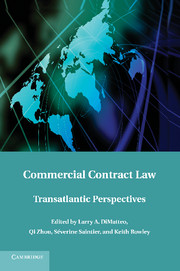Book contents
- Commercial Contract Law
- Commercial Contract Law
- Copyright page
- Dedication
- Brief Contents
- Contents
- Contributors
- Foreword
- Part I The Role of Consent
- Part II Normative Views of Contract
- Part III Contract Design and Good Faith
- Part IV Implied Terms and Interpretation
- Part V Policing Contracting Behavior
- 12 The Paradox of the French Method for Calculating the Compensation of Commercial Agents and the Importance of Conceptualising the Remedial Scheme under Directive 86/653
- 13 Unconscionability in American Contract Law
- 14 Unfair Terms in Comparative Perspective
- 15 (D)CFR Initiative and Consumer Unfair Terms
- Part VI Misrepresentation, Breach, and Remedies
- Part VII Harmonizing Contract Law
- Index
14 - Unfair Terms in Comparative Perspective
Software Contracts
from Part V - Policing Contracting Behavior
Published online by Cambridge University Press: 05 February 2013
- Commercial Contract Law
- Commercial Contract Law
- Copyright page
- Dedication
- Brief Contents
- Contents
- Contributors
- Foreword
- Part I The Role of Consent
- Part II Normative Views of Contract
- Part III Contract Design and Good Faith
- Part IV Implied Terms and Interpretation
- Part V Policing Contracting Behavior
- 12 The Paradox of the French Method for Calculating the Compensation of Commercial Agents and the Importance of Conceptualising the Remedial Scheme under Directive 86/653
- 13 Unconscionability in American Contract Law
- 14 Unfair Terms in Comparative Perspective
- 15 (D)CFR Initiative and Consumer Unfair Terms
- Part VI Misrepresentation, Breach, and Remedies
- Part VII Harmonizing Contract Law
- Index
Summary
The phenomenon of unfair terms in mass-market contracts is widely acknowledged, as is the fictional nature of “assent” or “consent” to all but a few obvious terms, such as price and key product features. Although some still argue for facilitating choice through better disclosure and education of customers, most policymakers, regulators, and scholars concede that there often can be no real assent to mass-market standard terms, but then balk at meaningful solutions to address market failure. The problem of nasty standard terms is seen as intractable.
A good example of recognition of the problem of unfair terms but reluctance to provide effective remedies is the recent project of the American Law Institute – the Principles of the Law of Software Contracts. The Principles address every issue raised by the coalition of software customers concerning unfair terms and practices, but they rely too heavily on after-the-fact judicial policing using broad standards and do not call for administrative prevention or enforcement. The Principles thus are mostly symbolic, although in several places they propose meaningful commands and in others they use illustrations to target specific suspect terms. Overall, they suggest some important ways to make software contracts fairer and succeed in making the point that policing of terms is more tractable if done industry by industry, with attention to particularities, but they stop short of a workable implementation strategy.
An alternative regulatory model is presented by the EU Unfair Contract Terms in Consumer Contracts Directive. The Directive has its own limitations, such as a scope limited to natural persons acting outside their trade or business. However, its greatest strength is an explicit recognition that unfair terms not only should be unenforceable, but also have to be kept out of contracts in the first place. Prevention of unfair drafting requires responsive regulation designed to curb and channel corporate culture. The United Kingdom’s Office of Fair Trading (scheduled for elimination in 2014 by the Coalition Government by being merged into a new Competition and Markets Authority) has made use of such an approach in its implementation of the Directive in UK law.
The quest for effective implementation of constraints on unfairness should continue. From a comparative perspective, the US and Europe each have something to learn from the other, and an amalgam of their approaches to unfair terms may provide better oversight than what either has devised so far.
- Type
- Chapter
- Information
- Commercial Contract LawTransatlantic Perspectives, pp. 339 - 365Publisher: Cambridge University PressPrint publication year: 2013



